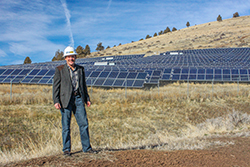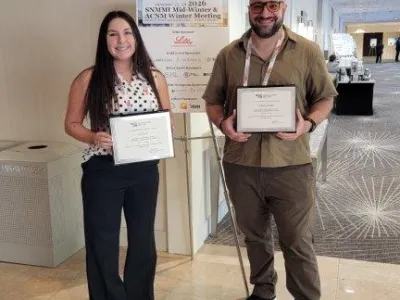
Dr. Nagi Naganathan, president of Oregon Tech said, “We are grateful to our Legislature and the Governor for investing in the future of Oregon’s workforce. Oregon’s economy, particularly its rural areas, calls for the education and training of student entrepreneurs who learn in real-world laboratories and classrooms, creating an innovation culture that has a direct and positive return for all Oregonians.”
A graduate of Oregon Tech, Dr. Terry’s experience in leadership and operations roles make him a strong leader for OREC. As a previous lead of global researchers for DuPont (formerly Innovalight) and experience working for the company for 10 years, Dr. Terry was part of one of the most successful science and engineering companies in the world. He gained vast experience working with innovative technology and software, and is Six Sigma Green Belt certified, giving him strong operations management assets as well.
In his new role as director, Dr. Terry will support the key goals of OREC: energy generation, talent development, and applied research and technical assistance for companies and communities. At this time he is establishing an advisory board consisting of faculty, distinguished alumni and industry leaders who will play an important role in OREC’s success and external branding. OREC also announced the Multidisciplinary Energy Partnership Request for Proposals for faculty and collaborators for the development of research projects funded by the legislature for 2017-18. The objective of these projects is to foster inter/transdisciplinary collaboration of faculty and student on renewable energy focused projects.
“I’m very excited to expand the reach of OREC through funding and grants,” said Dr. Terry. “This allows OREC to continue to support engineering education in the form of renewable energy labs, student projects and faculty-led applied research projects. I also plan to engage with Oregon Tech geothermal experts such as Dr. John Lund, Dr. James Zipay, and Dr. Eklas Hossain to expand OREC’s involvement in ongoing campus projects. There are also many opportunities to collaborate with the Oregon Manufacturing Innovation Center and I look forward to the partnerships that can be built.”
OREC was established in 2001 to integrate renewable energy technologies into energy systems for practical use by businesses and consumers. OREC works with faculty and students to conduct applied research, provide education and technical assistance, and work with industry and electric utilities in Oregon and the region to make renewable energy the energy of choice for the future of the nation. OREC also supports incorporating sustainability concepts into regular coursework across all disciplines, while programs such as Oregon Tech’s renewable energy, manufacturing and civil engineering, environmental sciences, and business management address sustainable practices directly.
Through additional legislative funding for the Center for Excellence in Engineering and Technology (CEET), Oregon Tech is also receiving updates to the existing Cornett Hall, which traditionally houses engineering labs and OREC. With the expansion, engineering departments of civil, electrical, manufacturing, mechanical, computer systems and renewable energy; and departments of geomatics, management, and information technology will also be housed within CEET, which increases the capacity for multidisciplinary projects.
Dr. Gary Kuleck, Oregon Tech provost said, “This is an excellent opportunity for Oregon Tech to show what can be done with seed investment from the state, and creates opportunity to show off the creative and industry-focused work of our faculty and students. We place emphasis on applied, multidisciplinary education and this allows students hands-on experience in their disciplines and preparation for careers in the industry through not only the projects they do, but the networking with the industry partners that will really accelerate student success when they graduate.”
Kuleck added, “We are already working on attracting a variety of industries to this area which are going to play an important role in the innovative ecosystem we’re building.
“A lot of states, including Oregon, already have or are implementing a mandate for businesses to supply a certain percentage of their electricity from renewable sources,” said Dr. Terry. “States are taking the lead on a lot of the renewable energy demand and expanding the renewable aspect of how businesses operate. The more we collaborate with businesses to understand their needs at this point, the better prepared we are, and Oregon Tech students are, to respond to the demand that is being built. Maintaining our presence as a leader in renewable energy education requires keeping on top of trends and technology.”
The State of Oregon's Renewable Portfolio Standard requirement is to achieve 50 percent renewables to meet the state’s electricity by 2040.
Dr. Terry’s Ph.D. is in Photovoltaic and Renewable Energy Engineering from the University of New South Wales, Australia. He also has a M.S. in Electrical Engineering from University of Washington and is a graduate of Oregon Tech with a B.S. in Electronics Engineering Technology.









